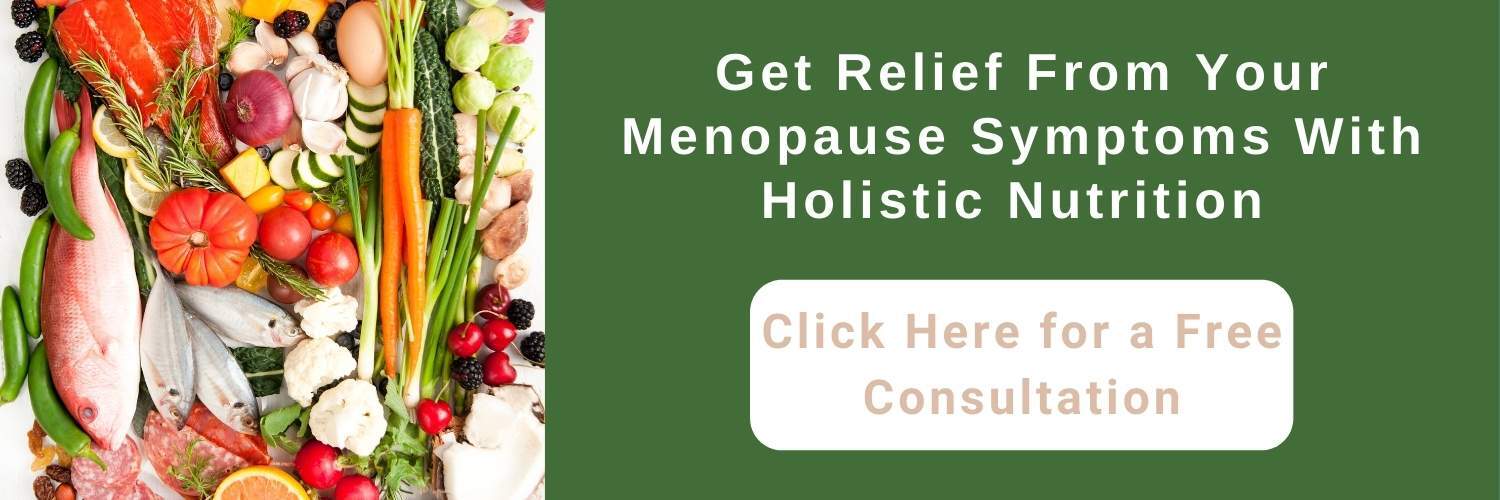How to Treat Menopause Brain Fog Through Supplementation and Holistic Nutrition
"The content below is not intended to be a substitute for professional medical advice, diagnosis, or treatment. Always seek the advice of your physician or other qualified health provider with any questions you may have regarding a medical condition."
As you’ve gotten older, have you found yourself forgetting things more often? Do you have difficulty concentrating or even thinking clearly at times?
People may have said, “You’ll get used to it. That’s just part of the aging process.”
Well, guess what? It doesn’t have to be.
Countless women have found help for menopause brain fog by using natural supplements and holistic nutrition.
Don’t know where to start?
Read on to find out.
Table of Contents
What Is Menopause Brain Fog?
Menopause brain fog is a dip in cognitive function experienced by women transitioning into the last years of their menstrual cycle (perimenopause) and in the early years of menopause.
Symptoms include:
- Forgetfulness
- Trouble making decisions
- Getting things mixed up
- Missing important details
- Reduced mental clarity
- Communication issues
- More time needed to process information
Obviously, this can be extremely frustrating. Imagine trying to explain something and not being able to come up with the words you need, or attempting to put in the PIN you’ve used hundreds of times at the ATM and suddenly drawing a blank.
Or maybe you don’t need to imagine it, because it’s happening to you every day lately.
So what can you do about it?
There are plenty of ideas out there about how to treat brain fog in menopause, but it can be difficult to know which ones are best for you.
HealthierU is here to help you combat and conquer menopause brain fog with
natural,
safe, and
healthy tools. We use Nutrition Response Testing to lead us to the
right diet, lifestyle, and supplementation that will relieve all of your menopause symptoms — including brain fog.
What Causes Brain Fog During Menopause?
Scientists believe that memory loss and other symptoms of brain fog are caused by the hormonal changes women experience before and during menopause. There is disruption and even absence of the hormones:
- Estrogen
- Progesterone
- Follicle-stimulating hormone
- Luteinizing hormone
These are responsible for different processes of the body including
brain function.
The 8 Best Natural Supplements for Menopause Brain Fog
If you prefer dietary supplements to help treat your symptoms over pumping your body full of unnatural medications and hormones, consider the following options.
While some of these supplements might work well for one person, they may not be as effective or can trigger side effects in others.
Try them out and see what helps you the most, and of course you should always consult a physician to make sure they won’t interfere with other conditions you have or medications you take regularly.
#1: Ginkgo Biloba
Ginkgo Biloba is an antioxidant that has been popular for decades due to its many benefits, including:
- Increased blood flow to the brain
- Anti-inflammatory properties
- Platelet-forming effects
These have led to improved cognitive function and memory for people who regularly use it, so Ginkgo Biloba is a good choice if you’re looking for menopause or perimenopause brain fog supplements.
As an added bonus, Ginkgo Biloba can also:
- Improve mood
- Increase energy levels
- Reduce the risk of Alzheimer’s disease
#2: Rhodiola Rosea
You may not have heard of this one, but Rhodiola Rosea has been used in Europe and Asia for hundreds of years. It’s a flowering plant that is known to be:
- Neuroprotective
- Cardioprotective
- Anti-oxidative
- Anti-carcinogenic
Studies have shown that this is also a top pick if you’re trying to figure out how to treat brain fog in menopause because it can improve the neuropsychological symptoms of:
- Fatigue
- Anxiety
- Depression
- Cognitive dysfunction
- Memory decline
- Stress intolerance
#3: Resveratrol
Resveratrol is a naturally-occurring compound found in foods like grapes, peanuts, cocoa, and berries.
While it is relatively new to the natural health scene, studies have shown that Resveratrol can enhance cerebrovascular function and improve regional blood flow in response to cognitive demands with enhancements in:
- Mood and perception of well-being
- Short-term memory
- Mental flexibility
- Reasoning
- Ability to maintain attention and concentration
#4: Omega-3 Essential Fatty Acids
Omega-3s are essential fats that many people refer to as brain food. Since our bodies can’t produce them, we have to ingest them through a diet of:
- Fish such as mackerel, salmon, and herring
- Cod liver oil
- Oysters
- Flax seeds
- Chia seeds
- Walnuts
Omega-3 essential fatty acids are vital nutrients for healthy brain function that can fight inflammation and
menopause-related mental decline.
#5: Vitamin E and Antioxidants
Vitamin E is a vital component of brain health.
This is because of its powerful antioxidant properties, which protect brain cells against damage from free radicals that occur naturally in the body and come from outside pollutants.
Vitamin E also diminishes inflammation in the body and may help reduce the risk of depression, which can both aid in improved brain health and the elimination of menopause brain fog.
#6: DHA and ALA (Fish Oils)
Fish oils are a must when it comes to brain health.
They are made up of essential fatty acids such as DHA and ALA, which are important in brain function and can decrease inflammation.
Deficiencies in these fatty acids have also been linked to mood disorders, which can exacerbate the symptoms of menopausal brain fog.
A better mood leads to a better brain.
#7: Lutein
Lutein is a plant-based vitamin also known as carotenoid.
Although most well-known as an eye health supplement, it is also an important ingredient in brain health supplements due to its
cognitive benefits and links to
long-term brain health.
#8: Vitamin B Complex
B-complex vitamins play an essential role in a variety of bodily functions.
Specifically, vitamin B6 helps with brain development in that it aids in the formation of neurotransmitters, which send important signals between parts of your brain or from your brain to your muscles.
Your brain must be able to communicate with itself and your body to be healthy, so a vitamin B Complex is a fundamental part of combatting the brain fog that comes with perimenopause and menopause.
What Is the Best Supplement For Brain Fog
With countless supplements out there, it can be difficult to know which ones are best for your needs.
Always consult your doctor about such issues, but
adrenal adaptogens, antioxidants, and Omega-3s
have been shown to most effectively reduce menopause brain fog, so they are a great place to start. Nutrition Response Testing is a great way to identify what your body needs most, and we can help you with that at HealthierU.
6 More Ways to Naturally Combat Menopause Brain Fog so You Can Start Feeling Like Yourself Again
Menopause happens to every woman, but you don’t have to let it take over your life. There are many
natural remedies for menopause that will help you get control of your symptoms, including the dreaded brain fog.
#1: Get Enough Sleep
Poor sleep quality can make your brain fog worse, but sleep problems are common in menopausal women.
Some things you can do to get a longer and better night’s sleep are:
- Avoid eating large meals before bedtime and try to avoid acidic or spicy foods.
- Watch out for the stimulants caffeine and nicotine later in the day and be aware that alcohol consumption may also disrupt sleep.
- Wear loose and lightweight clothing, avoid heavy bedding, and turn down the thermostat to keep the room cool.
- Use relaxation techniques like deep breathing, yoga, or massage to eliminate stress and foster a peaceful night of slumber.
A well-rested brain will have
more clarity and better function, making it less likely to fall victim to the symptoms of brain fog.
#2: Exercise Your Body
Regular physical activity is important for everyone, and women going through menopause are no exception. In fact, it may become increasingly vital as we age since researchers have shown that exercise can boost memory and thinking.
Experts say you should aim for
30 minutes of cardiovascular exercise
five days a week. Some activities you might include in your routine are:
- Walking
- Jogging
- Cycling
- Water aerobics
You don’t have to go all out to reap the benefits of exercise — just get your body moving and your heart pumping.
#3: Manage Your Stress
Of course, you are going to feel some stress surrounding menopause.
Hormonal changes,
hot flashes, and
brain fog symptoms like memory loss and having trouble communicating can cause a great deal of anxiety. Sleep and exercise play big roles in reducing stress, but you can also:
- Talk with a family member, friend, healthcare professional, or counselor about your concerns.
- Practice healthy mind-body techniques such as deep breathing, positive thinking, guided imagery, hypnosis, and meditation.
- Pamper yourself with a massage, manicure, or soothing bath.
- Have sex. This part of your life should not stop just because you’ve hit menopause, and it can be a great stress reliever.
- Laughter really is the best medicine. Researchers have found that even the thought of laughing helps regulate stress hormones like cortisol. Find things that keep you smiling and happy throughout your day.
#4: Exercise Your Mind
Just like your body, your brain needs regular workouts as you age.
There are plenty of ways to do it and you can focus on your areas of interest to accomplish this task. If you aren’t sure how to get started, try:
- Puzzles (word, number, or jigsaw)
- Starting a new hobby or learning a new skill
- Social engagements — talking to people and getting out of your repetitive daily cycles can keep the brain engaged
- Reading and playing games
- Taking a class
- Keeping lists of everything you need to do in a day — this can help organize your thoughts when your brain is foggy.
Fighting the symptoms of brain fog by
keeping your mind engaged can be quite enjoyable and will enrich your life in many ways.
#5: Eat a Balanced Diet
When looking for help with menopause symptoms, nutrition can be one of the last things some women consider.
But it’s probably where they should start!
What we eat can
harm our bodies
or it can heal them
. If you choose the right foods, you may find relief from a variety of symptoms of menopause including brain fog.
Here are some great options to include in your diet:
- Seafood — fish such as tuna, sardines, and anchovies are chock-full of healthy fats that can help your brain.
- Nuts and seeds — also containing plenty of healthy fats, foods like avocado, coconut, pecans, and chia seeds are great options.
- Foods rich in vitamin D such as mushrooms, fish, and eggs
- Foods that restore gut health — colorful vegetables, fruits in moderation, and fermented items like kombucha and sauerkraut, for example
Find Out how Nutrition Response Testing Can Provide Help for Menopause Brain Fog and Other Symptoms
At HealthierU, we want to teach you how to treat brain fog in menopause using natural and effective methods.
Our Nutrition Response Testing program is
custom-designed to suit your individual needs, and we’ll use the results to recommend nutrition, supplements, and lifestyle changes that will help reverse your menopause symptoms.
Contact us today to get started.






